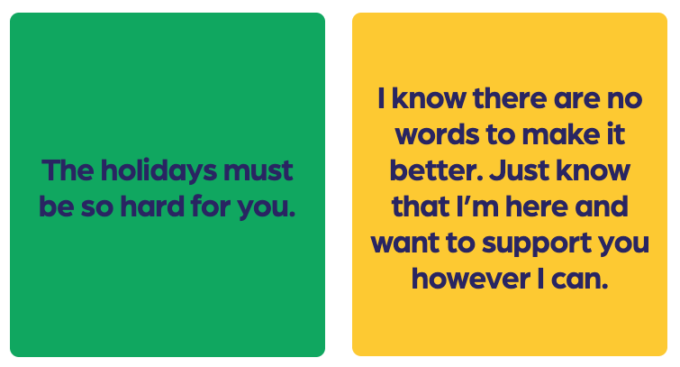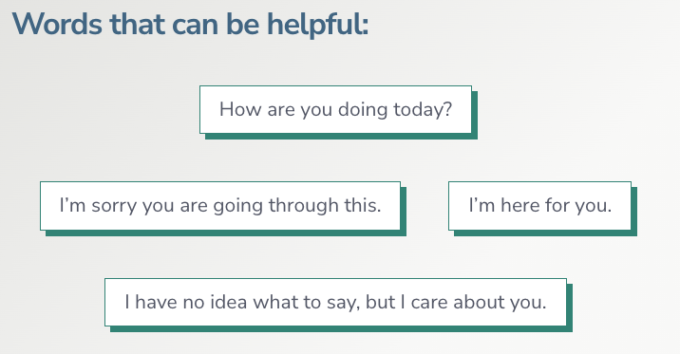
Maintain Connection
Supporting Loss
It’s easy for a person experiencing loss to feel isolated and lonely. Even if it’s uncomfortable, making efforts to help the person feel included, seen, and heard can make a big difference in their loss experience.
Social Inclusion is Important
“Human beings are social animals, and we have been selected by evolution to live together with others. Social exclusion tells us that social relationships are threatened or damaged, and therefore, exclusion tells us there is a crisis, by causing aversive feelings.” –Frontiers for Young Minds
We can unknowingly contribute to this feeling through what we say or do–and from what we don’t say or do. This often stems from a feeling of fear or discomfort. The desire to avoid pain is a natural human instinct. When we’re around people who are going through a hard time, it can remind us that bad things happen. This can lead us to subconsciously distance ourselves from the source of the reminder–often the very person we may be trying to support.
The Feeling of Exclusion
In this clip from Speaking Grief, Megan Bolich shares the isolation that can come with loss.
“I think the most surprising thing was how much people disappear.”
Megan Bolich bereaved sibling
Unfortunately, Megan's experience is the rule rather than the exception for most people navigating loss. Loss can set kids and teens apart from their peers. At best, the social isolation that can accompany loss can leave kids and teens feeling ostracized and othered. At worst, they can be targets of bullying. Sometimes this behavior stems from jealousy if the child experiencing loss is receiving extra attention.Often, it comes from fear; we tend to fear what we don’t understand or what/who we perceive as being different from us.
Overcome Fears
Fear of Contagion
It may seem strange to think of life events like death, divorce, or incarceration as “contagious,” but many of us operate from an unconscious belief that by associating with someone who is experiencing such a hardship, we become more likely to experience it ourselves.
Let's say you are the leader of an after-school program and the sibling on one of the kids in your group was recently killed in an accident. You notice the another program member who used to regularly interact with the bereaved child is now keeping their distance. If you had a conversation with them, you might discover that they are harboring a fear that their sibling might die was well and avoiding their grieving friend helps them feel safe. It may not be rational, but it's a common reaction.
Fear of Failure
Another common fear-based reason we distance ourselves from people experiencing a loss is because we’re afraid of saying or doing the wrong thing. The simplest way to navigate this fear is to be honest. It’s okay to admit you aren’t sure what to say or do. In fact, it tends to go over much better than trying to act like you have all the answers.
Fear Based on Assumption
Sometimes, we make assumptions about the person who is experiencing a loss. We might assume they want to be left alone and fear that we’ll make them feel uncomfortable if we attempt to include them. Or we might think inviting them to a “normal” activity makes it seem like we don’t care about what they are going through. Once again, transparency is key. It’s okay to acknowledge their situation while also assuring them they are welcome.
As we work with the young people in our lives and encourage them to support their peers, we need to pay careful attention for signs that the child or teen experiencing loss is being excluded or is the target of abusive behavior. Virtually any type of loss can make a child or teen more vulnerable to being “othered.”
Othering vs. Welcoming Behavior
Compare the examples of behaviors that can create social isolation with an opposite behavior that welcomes a grieving person.
Othering
Welcoming
-
Walking the other way when you see the person because you feel awkward.
-
Not saying anything to the person because you’re worried you will say the wrong thing.
-
Changing normal patterns of communication (e.g., you used to text them every day and now it’s been weeks since you last reached out).
-
Not inviting them to things you would have invited them to in the past.
-
Acknowledging the person’s presence.
-
Speaking to the person, even if it’s just saying hello.
-
Making an effort to consistently check in with the person and maintain normal patterns of communication (unless they have specifically asked you not to).
-
Inviting them to participate in activities and letting them know it’s okay if they don’t feel like coming, but you want them to know they’re welcome.
Guide Rather Than Push
Most of us don’t respond well when we feel judged or criticized. The kid or teen you’re trying to guide is no different. Stay curious. Be present. Practice active listening. Offer suggestions rather than commands. By doing so, you're modeling the very curiosity they will need to develop their own introspection. If they ask you how you would have responded, be transparent about any discomfort you have and normalize those emotions.
Unpacking Othering
The Isolation of Immigration
There are many loss experiences than can leave a person feeling isolated; one example is immigration. In this video from Story Booth, a girl named Corrie describes the challenges and isolation she faced when she emigrated with her parents from The Philippines to the U.S.
“I always cried because no one wanted to be my friend and I couldn’t understand what the teacher was saying.”
Corrie, emigrated from The Philippines with parents
Normalize Differences
In this video, Corrie describes a number of differences between her and her peers. It is okay to notice differences. In fact, pretending not to notice can be more harmful than helpful. Differences become problematic when we view them as something to be scared and/or critical of.
Consider Your Frame of Reference
Corrie notes how the lunch her parents would pack for her typically consisted of things like rice and eggs. She goes on to share that her classmates thought this food looked and smelled “weird.” If you were working to guide one of her classmates to avoid othering and adopt a more welcoming mindset, you ask questions like:
- "Hmm, you're saying that Corrie's lunch is 'weird.' For something to be weird means it deviates from what's normal. Who decides what makes something normal?"
- "The food her parents prepare for her might be a bit different from what you eat, but does that really make it 'weird'?"
Examine Anxiety
If a kids or teen expresses anxiety to you about showing up for someone who is experiencing a loss, encourage them to get curious about that feeling. You could ask them things like:
- What is this experience bringing up for you?
- What about this are you feeling uncomfortable with?
- It sounds like you feel different from this person because they’ve experienced this thing and you haven’t. In what ways are you similar?
Keep At It
When someone is processing the big feelings related to loss, their needs and desires will often change over time. If you've made efforts to engage in welcoming behaviors and the person has asked for space, try to keep at it. Maybe they don't want to respond to a text or join you in an activity this week because they feel overwhelmed but next week they might be craving connection.
Sharing What You Know
You can help make a difference by learning how to guide kids and teens to welcome their grieving peers in rather than shut them out.
Connection Resources

Flip the Script
Description: This flip-card activity from NACG provides better alternative to common statements people make in effort to comfort a grieving individual.
Source: NACG

What to Say
Description: Helpful words and brief videos about words that are welcome and support grievers.
Source: WPSU, Speaking Grief
